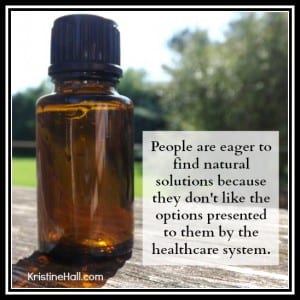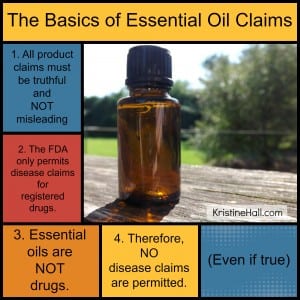Can I write about essential oils and specific diseases on my blog if I post links to the research studies?
 (If you missed them, you can read part 1 here and part 2 here.)
(If you missed them, you can read part 1 here and part 2 here.)
Can I write about essential oils and disease prevention/treatments/cures if the science backs me up?
There are no simple answers. The answer could be ‘yes’ or ‘no’ depending on the circumstances.
The following dialogue is typical of many conversations taking place among friends, family members and business partners.
Ryan: “Absolutely, yes! And here’s why:
- The research studies are available to the public.
- We have the right to free speech.
- People need to know that essential oils are the real deal.
- Get rid of the ‘snake oil’ mentality by promoting the science.”
Kristine: “You are right:
- The research is public.
- In theory, we have the right to free speech. (not expanding on that one)
- Essential oils are the real deal.
- The information needs to be talked about among the general population, not just the scientists.”
Yep. Our conversation sounded pretty much like that.
Reasons for discussing research about essential oils and disease prevention/treatments/cures:
- I will always be truthful and never mislead my readers.
- Those FDA rules are written specifically for claims on product labels! [1]
- People are eager to find natural solutions because they don’t like the options presented to them by the healthcare system.
Reasons for NOT discussing essential oil disease claim research:
- Even though I have no links on my site to purchase essential oils, I am still the representative of an essential oil company.
- My EO company has recommended that we do not talk about essential oils in a way that would classify them as drugs.
So, what am I allowed to talk about?
- cosmetic claims
- structure claims
- function claims
- body systems
That is the type of essential oil research I will write about on my blog.
How can you, dear reader, apply this information? Two situations, two answers.
Are you simply looking for information about essential oils?
- My first suggestion is to start archiving information from sources that you know and trust. We have been lulled into thinking that we don’t need to save information because we can always look it up when we need it.That trend is ending. There is a lot a useful information online that may not be available in the future.Think about it.Fill in the blanks for me. One of my favorite sites is Dr_______. On Dr_______’s site, he/she cites research about disease cures and also sells supplements which solve the problem. Even if their claims are true, they are violating the FDA regulations.Only registered drugs can be advertised to cure/treat/prevent disease. It is only a matter of time before this information is removed.
- Find the original sources for the research. Here are the first three places I look:GreenMedInfo.com This website “exists in order to provide convenient and open access to the biomedical research available today on the therapeutic value of natural substances in disease prevention and treatment.* Our website and video-based learning site GreenMedTV.com provides physicians, health care practitioners, clinicians, researchers and the layperson with an evidence-based resource through which the potential or actual therapeutic value of vitamins, minerals, herbs and foods can be determined.”
*The information we provide access to is not intended, nor designed to diagnose, treat, prevent or cure any disease.
AromaticeScience.com This site has a library of research studies on essential oils.
PubMed “PubMed comprises over 24 million citations for biomedical literature from MEDLINE, life science journals, and online books. PubMed citations and abstracts include the fields of biomedicine and health, covering portions of the life sciences, behavioral sciences, chemical sciences, and bioengineering. PubMed also provides access to additional relevant web sites and links to the other NCBI molecular biology resources. PubMed is a free resource that is developed and maintained by the National Center for Biotechnology Information (NCBI), at the U.S. National Library of Medicine (NLM), located at the National Institutes of Health (NIH).”
 Do you sell essential oils and want to talk about them online? If so, I strongly recommend that you only talk about studies in the allowable categories: cosmetic, function, structure, or body system. Anything else puts you or the company you represent at risk.
Do you sell essential oils and want to talk about them online? If so, I strongly recommend that you only talk about studies in the allowable categories: cosmetic, function, structure, or body system. Anything else puts you or the company you represent at risk.
If you want help talking about essential oils in a compliant way, you might like the Wellness Language Toolbox I created for my own use. I worked closely with both the compliance department and the marketing department at my essential oil company to ensure that it is compliant.
You can find it here: WellnessLanguageToolbox.com
p.s. If you want to read about essential oils and body systems, (and other wellness topics) please sign up for my newsletter.
Reference:
- FDA Guidance for Industry page 1




Pingback: Dos & Don'ts for talking about essential oils (part 2) - KristineHall.com